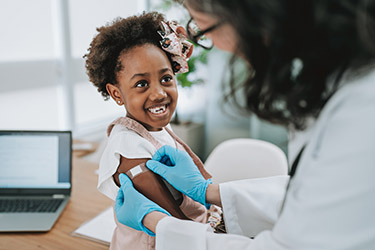Measles is on the rise in several states. Since December, we have had over two dozen cases and growing of the potentially deadly disease. It’s one of the most highly contagious infections we know of, but easily prevented with one of the most effective vaccines available.
The rising case count is a tragic story because we had this devastating disease under control in the U.S. It’s also one of the best examples of how mis- and disinformation undermine public health by leading people astray and convincing them not to get a vaccine that will protect them from serious harm or death.
Vaccinations have been an important part of our nation’s public health toolbox for over 200 years. They’re the result of major scientific breakthroughs that have led to public health milestones, such as the elimination of polio in the U.S. and the global eradication of smallpox over 40 years ago.
During the global COVID-19 pandemic, we reached into that toolbox once again. The result was a vaccine that prevented over 3 million deaths, almost 19 million hospitalizations and nearly 120 million additional COVID-19 infections over two years, according to the Commonwealth Fund.
It’s because of our decades-long trust in vaccine science that we routinely protect our kids through immunization. Starting in a child’s early months, getting vaccinated against disease like measles, whooping cough and mumps is an important step to living a life free of pain and unnecessary suffering from preventable infectious diseases. These vaccinations are a crucial part of building a healthy population.
But an ever-rising tide of anti-science misinformation that is fueled by social media and empowered by some policymakers and civic leaders continues to eat away at the progress our country has made in protecting our nation’s health and well-being. Instead of relying on trusted experts, millions of Americans are turning to sources that lack science-based evidence.
The result: A sicker, more vulnerable population.
Measles was eradicated in the U.S. in 2000 because of a highly effective vaccination campaign. But in 2019, less than two decades later, the number of cases was over 1,200. Among kindergarteners, vaccine rates for measles, mumps, rubella and polio are falling.
Vaccination rates for measles were around 92% for kindergartners in the 2021-2022 school year, below the required level of 95% to contain any infections and protect those who truly can’t be vaccinated for health reasons. But life disruption from the pandemic is not only to blame: The number of vaccine exemptions — which allow parents to opt out of immunizing their children — increased in 41 states.
Despite the pain and hardship of losing more than 1 million people from COVID-19 in the U.S. alone, we still have people who have been persuaded not to get the most up-to-date vaccine against COVID-19. Even with evidence of the safety and efficacy of these vaccines, as of December only 17.2% of adults and 7.7% of children had received it.
Uptake of the influenza vaccine has also been impacted by mistrust, with 7.4 million fewer people receiving their shots as of November compared to the previous flu season.
With recent setbacks in vaccine uptake, it is time for us to dig into another important part of our toolbox: public health education. The U.S. has a sound approval system to evaluate the safety and efficacy of vaccines, along with some of the best vaccine safety monitoring systems in the world. We must carry that message to the public.
Members of Congress are meeting this week with vaccine experts from the Centers for Disease Control and Prevention, the Health Resources and Services Administration and the Food and Drug Administration in a hearing on vaccine safety and effectiveness. This hearing is an opportunity for our elected leaders to educate the public about how safe and effective our lifesaving vaccines are.
We implore Congress to use this as an opportunity to fight vaccine misinformation with the facts about what history has already shown us: that vaccines are one of the world’s miracles. They are safe and they save lives.
Georges Benjamin, MD, is executive director of the American Public Health Association.
Photo by Andreswd, courtesy iStockphoto